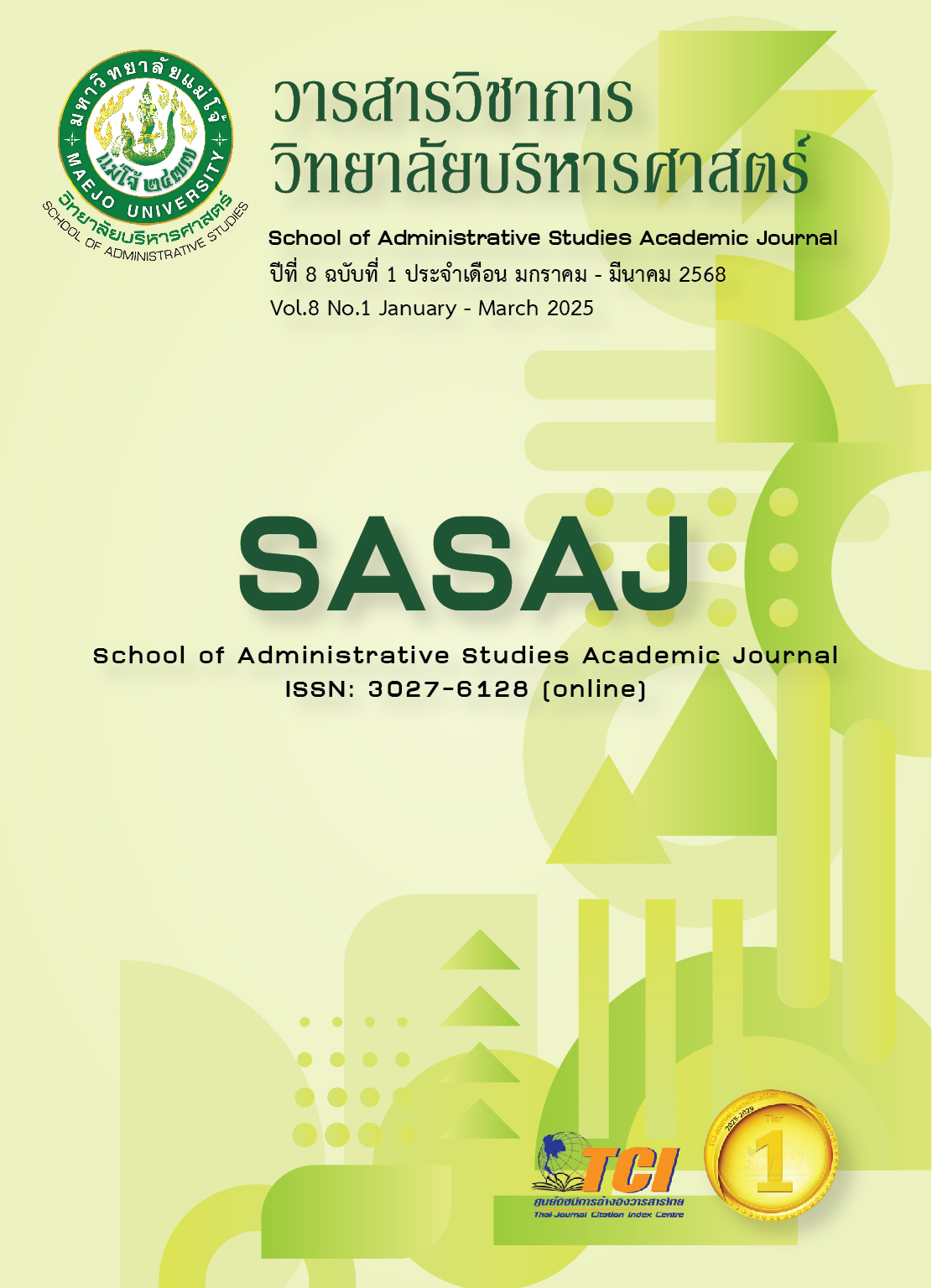จริยธรรมนักการเมืองและเจ้าหน้าที่รัฐกับความมีเสถียรภาพทางการเมือง
Main Article Content
บทคัดย่อ
งานวิจัยมีวัตถุประสงค์เพื่อ 1) ศึกษาระดับของจริยธรรมนักการเมืองและเจ้าหน้าที่รัฐ และความมีเสถียรภาพทางการเมือง และ 2) ศึกษาความสัมพันธ์ระหว่างจริยธรรมนักการเมืองและเจ้าหน้าที่รัฐกับความมีเสถียรภาพทางการเมือง โดยผู้วิจัยใช้แบบสอบถามที่พัฒนาขึ้นมาจากการทบทวนวรรณกรรม และนำไปรวบรวมความเห็นของผู้ที่มีอายุตั้งแต่ 18 ขึ้นไป และมีที่พักอาศัยอยู่ในเขตภาคตะวันออกเฉียงเหนือในประเทศไทยจำนวน 400 คน แล้วนำกลับมาวิเคราะห์ผลด้วยสถิติวิเคราะห์ค่าเฉลี่ย, ส่วนเบี่ยงเบนมาตรฐาน และค่าสัมประสิทธิ์
ผลวิจัยพบว่า
1. จริยธรรมนักการเมืองและเจ้าหน้าที่รัฐ โดยภาพรวม อยู่ในระดับน้อย ด้านที่มีค่าเฉลี่ยมากที่สุด คือ การมุ่งผลสัมฤทธิ์ของงาน รักษามาตรฐาน มีคุณภาพโปร่งใส และตรวจสอบได้ รองลงมา คือ การยึดมั่นในระบอบประชาธิปไตยอันมีพระมหากษัตริย์ทรงเป็นประมุขและน้อยที่สุด คือ การให้ข้อมูลข่าวสารแก่ประชาชนอย่างครบถ้วน ถูกต้อง และไม่บิดเบือนข้อเท็จจริง
2. ความมีเสถียรภาพทางการเมือง โดยรวมอยู่ในระดับมาก ด้านที่มีค่าเฉลี่ยมากที่สุด คือ พรรคร่วมรัฐบาล รองลงมา คือ กฎหมาย และน้อยที่สุด คือ ประชาชน
3. จริยธรรมนักการเมืองและเจ้าหน้าที่รัฐมีความสัมพันธ์กับความมีเสถียรภาพทางการเมือง ในระดับสูง อย่างมีนัยสำคัญทางสถิติที่ระดับ .01
Article Details

อนุญาตภายใต้เงื่อนไข Creative Commons Attribution-NonCommercial-NoDerivatives 4.0 International License.
ลิขสิทธิ์
เอกสารอ้างอิง
กรมการปกครอง. (2565). โครงสร้างข้อมูลสถิติจำนวนประชากรไทยที่มีชื่ออยู่ในทะเบียนบ้านแยกรายอายุรายเดือน. สืบค้นจาก https://stat.bora.dopa.go.th/new_stat/webPage/statByAgeMonth.php
กรุงเทพโพลล์. (2560). ปัญหาคอร์รัปชั่นในมุมมองคนไทย. สืบค้นจาก https://bangkokpoll.bu.ac.th/poll/result/doc/poll847.pdf
กัญญ์สิริ จันทร์เจริญ. (2554). บทที่ 5 การกำหนดประชากรและกลุ่มตัวอย่าง. สืบค้นจาก https://www.ict.up.ac.th/surinthips/ResearchMethodology_2554.PDF
จารุบุตร เรืองสุวรรณ. (2556). บทบาทของรัฐสภาต่อความมั่นคงทางการเมือง. รัฐสภาสาร, 31(6), 17-30.
ไทยรัฐออนไลน์. (2555, 12 พฤษภาคม). เปิดแผนเชิงรุก นายกฯดีเดย์ ปราบคอรัปชั่น. ไทยรัฐ. สืบค้นจาก https://www.Thairath.co.th./content/pol/259706
ประสพชัย พสุนนท์. (2558). ความเชื่อมั่นของแบบสอบถามในการวิจัยเชิงปริมาณ. วารสาร ปาริชาติ มหาวิทยาลัยทักษิณ, 27(1), 144-163.
พระครูปลัดวัชรพงษ์ วิชิรปญฺโญ. (2564). การสร้างภาพลักษณ์ทางจริยธรรมของนักการเมืองไทยยุคใหม่. ใน การประชุมวิชาการระดับชาติครั้งที่ 7 “วิถีพุทธ วิถีชุมชน รากฐาน ชีวทัศน์เชิงสังคมล้านนาในสังคมวิถีใหม่” (น. 717-727). ลำพูน: วิทยาลัยสงฆ์ลำพูน มหาวิทยาลัยมหาจุฬาลงกรณราชวิทยาลัย.
พิชญ์ พงษ์สวัสดิ์. (2562, 4 มิถุนายน). ความไม่มั่นคงของความมั่นคงทางการเมือง. มติชน. สืบค้นจาก https://www.matichon.co.th/article/news_1521190
ลิขิต ธีรเวคิน. (2562). ประชาธิปไตยไทยในทศวรรษใหม่ ประชาธิปไตยไทยในทศวรรษ 21: ทางตัน ทางออก และแนวทางแก้ไข. กรุงเทพฯ: สถาบันพระปกเกล้า.
วิทยา จิตนุพงศ์. (2560). ความมั่นคงทางการเมืองของระบอบประชาธิปไตยในระบบรัฐสภา.วารสารวิชาการ มหาวิทยาลัยราชภัฏพระนคร, 8(2), 104-120.
วีระศักดิ์ จินารัตน์. (2564). ระเบียบวิธีวิจัยสมัยใหม่. อุบลราชธานี: ยงสวัสดิ์ อินเตอร์กรุ๊ป.
ศรัณย์ วงศ์คำจันทร์. (2555). จริยธรรมนักการเมืองไทย. วารสารวิจัย มข, 2(3), 263-282.
สมชาย ชูเมือง. (2565). เสถียรภาพทางการเมืองของรัฐบาลพลเรือน. วารสารสิรินธรปริทรรศน์, 23(1), 337-346.
สุวิชาน มนแพวงศานนท์. (2543). วิเคราะห์ข้อมูลทางสถิติด้วย SPSS for Windows. กรุงเทพฯ: ซีเอ็ดยูเคชั่น.
Secretariat of the House of Representatives. (2017). Constitution of the Kingdom of Thailand B.E. 2560 (2017). Bangkok: Secretariat of the House of Representatives.


